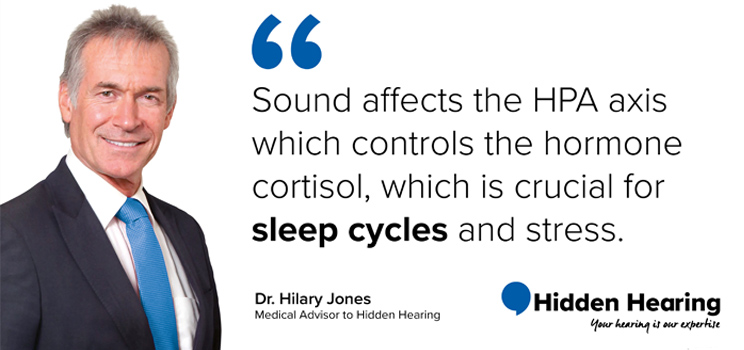Sleep restores the brain; the brain reorganises and recharges itself, and removes toxic waste by products which have accumulated throughout the day.
Many of us, however, have problems with either falling asleep or staying asleep, or struggle with early morning waking, or interrupted sleep.
Several studies have investigated how music positively impacts age-related sleep problems, and the latest EuroTrak survey for the UK highlights the importance our hearing plays in sleep quality and feelings of exhaustion. The report, which surveyed a large group of people with hearing loss (both with and without hearing aids), reveals that sensory overload and overstimulated nervous systems negatively impact people’s emotional and cognitive health.

Hearing loss and sleep
The majority of people with hearing loss say that their reduced hearing ability negatively impacts their sleep quality, more than 20% believe their hearing is causing a sleeping disorder, and some just feel it causes physical as well as mental exhaustion in their everyday lives. For those surveyed, over half of hearing aid users got regular, ‘quality sleep’. They also feel significantly less physically and mentally exhausted in the evenings compared with people with a hearing loss that don’t use hearing aids.
It might seem counter-intuitive that increasing the amount of clear sound notes you hear throughout the day makes you less tired in the evenings, resulting in better sleep.
GP and Medical Advisor to Hidden Hearing, Dr Hilary Jones, explains: “You are impacted by the way your brain makes sense of sound; sensory overload and overstimulated nervous systems negatively impact your emotional and cognitive health. Sound affects the hypothalamic-pituitary-adrenal (HPA) axis, a key part of the neurochemical system that regulates not only attention and mood, the HPA axis also controls the hormone cortisol, which is crucial for sleep cycles and stress.”
The EuroTrak survey shows that only a fraction of those with a hearing loss acknowledge that their hearing is not good, and less than 50% of those actually take a hearing test. This is a concerning statistic, especially considering that two thirds of those who do get hearing aids regret having waited so long to take a hearing test.
Dr Hilary Jones says, “More and more people are investing in their mental health with exercise, digital detoxes, and meditation. Still, we see so many that postpone testing their hearing despite the fact that it’s quick and free. I think many are not aware how much their daily soundscape impacts their neurochemistry and thereby a calm state of mind.”
Simply put, hearing is neurochemistry, and good hearing can significantly contribute to your overall mental and physical well-being. So much so that 95% of the people in the UK say that their hearing aids improve their quality of life.
Take a quick online hearing test
Our online hearing test is free, takes five minutes and is a great way to get a general idea of how well you can hear. Follow the link to take the test now.
Sources:
Sleep: The Neuroprotective Aspects of Sleep - PMC (nih.gov)
Music interventions: Chen et al., 2021; Petrovsky et al., 2021; Wang et al., 2021
EuroTrak UK, 2022: Folie 1 (ehima.com)

